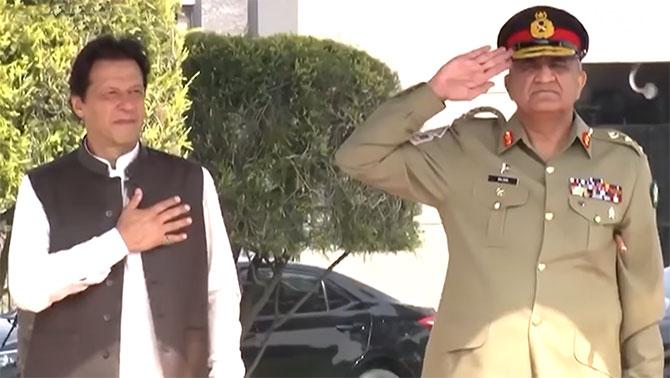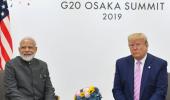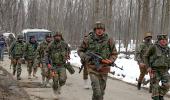'With the extension issue settled clearly in his favour, Gen Bajwa would be free to fashion a more hardline policy against India.
'We could, therefore, expect a raising of the ante in Kashmir,' says Rana Banerji, who headed the Pakistan desk at the Research and Analysis Wing, India's external intelligence agency.

Though anticipated for a while, the timing of Gen Qamar Javed Bajwa's three-year extension, announced in a terse order from Pakistan Prime Minister Imran Khan's office on August 19, comes as a surprise.
The order, below, is justified on grounds 'of the regional security environment', a thinly veiled reference to the situation in Kashmir and the ongoing Afghan talks.
After the 2018 elections and the crackdown against Opposition leaders of mainstream political parties, this was payback time and Imran Khan has obliged.
The extension would take Bajwa's term as Pakistan's Army chief till November 29, 2022.
Even after the next phase of retirements of three lieutenant generals in end September, as many as 22 other three-star generals will phase out, between November 2019 and November 2022, before Bajwa finally hangs up his boots.
This decision may not go down very well with the senior collegiate leadership of generals, including his corps commanders, but they will have no choice but to fall in line.
They would have seen it coming and it has happened before, most recently in 2010, when Asif Zardari obliged Gen Ashfaq Kayani, to save his own chair.
The circumstances may be slightly different now but no chief has remained as popular afterwards, especially if the facade of a democratic set-up is to be kept intact.
 After November 2022 the senior-most serving lieutenant generals will be Lt Gen Sahir Shamshad Mirza, Sind Regiment, currently adjutant general; Lt Gen Azhar Abbas, Baluch Regiment, currently director general, joint staff; Lt Gen Nauman Mehmood, Baluch Regiment, currently inspector general, communications & information technology; and Lt Gen Faiz Hamid, Baluch Regiment, currently DG, ISI.
After November 2022 the senior-most serving lieutenant generals will be Lt Gen Sahir Shamshad Mirza, Sind Regiment, currently adjutant general; Lt Gen Azhar Abbas, Baluch Regiment, currently director general, joint staff; Lt Gen Nauman Mehmood, Baluch Regiment, currently inspector general, communications & information technology; and Lt Gen Faiz Hamid, Baluch Regiment, currently DG, ISI.
They would have to serve in corps commands before they become eligible for the top post.
In the meantime, Bajwa would have a free hand to reshuffle his pack.
For the time being, the three most powerful generals in Pakistan would be the chief and his two trusted henchman, Faiz Hamid, DG, ISI and Maj Gen Asif Ghafoor, DG, Inter Services Public Relations (ISPR).
The Rawalpindi corps commander, Lt Gen Bilal Akbar, remains a favourite but he will feel pangs of disappointment.
With the extension issue settled clearly in his favour, Bajwa would be free to fashion a more hardline policy against India.
We could, therefore, expect a raising of the ante in Kashmir, especially after the threat of the Financial Action Task Force recedes, post October 2019 assessments.
Three years is a long time in Pakistani politics and it remains to be seen if Imran Khan develops ambitions by then, to exercise real power. This too has happened before.
Will Imran and Bajwa 'continue to remain on the same page' then?










